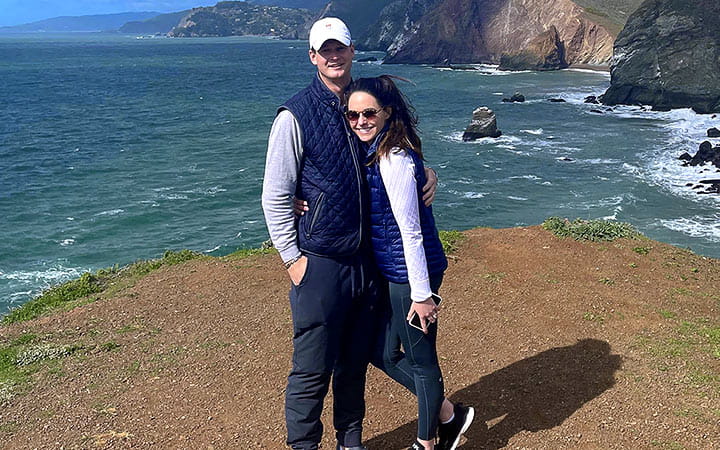Rare Cancer Diagnosis Brings San Francisco Patient To UH
March 18, 2021

She began suffering from insomnia and night sweats. Acne covered her torso. Fatigue cramped her post-workout exhilaration. Her face and neck appeared swollen, though her fit body gained no weight. Seeing her husband and father again after a business trip, they were stunned by her altered appearance.
A routine that previously began every morning with a regular workout soon was filled with visits to doctors, seeking a definitive diagnosis for a spate of concerning symptoms. When her blood pressure skyrocketed, a physician friend of hers at UH – dermatology resident Rebecca Sarac, MD – advised she get a cortisol test for Cushing’s syndrome.
“I was living in this high-adrenaline mode for months,” said the Cleveland native, who moved to San Francisco in her 20s. “I kept pushing and being an advocate for my own health, going to one doctor after another, but no one was able to put the pieces together.”
A Complicated Puzzle
University Hospitals Seidman Cancer Center finally solved the puzzle. Tara’s cortisol test revealed levels three times beyond normal. The next step was an MRI, but she couldn’t get an appointment for several weeks in California. So she hopped on a red-eye flight to Cleveland for a Saturday appointment at UH Cleveland Medical Center and returned to San Francisco that night. She was in an important Monday meeting when UH called with her diagnosis: an 11-centimeter tumor on her adrenal gland, which regulates hormones.
Tara immediately returned to Cleveland for surgery. Scott Wilhelm, MD, Chief of Endocrine Surgery, meticulously removed the grapefruit-sized tumor lodged in her adrenal gland. Fortunately, a PET scan confirmed that the cancer had not spread to other organs.
With acquisition opportunities and travel grinding to a halt, Tara decided to stay in Cleveland and continue her treatment at UH for radiation and oral chemotherapy. She appreciated being able to stay with the doctors who diagnosed and treated her, rather than shifting her care back to the Bay area after surgery.
“Everything shut down, so I was able to prioritize my health,” says Tara, whose mother died from advanced breast cancer in 2008 and was a devoted UH patient. “I wanted to stay at UH, I didn’t want to leave. I felt so comfortable in such good hands.
“The fact that UH was able to move so quickly helped me mentally but also helped my outcome. Their approach was scientific but straightforward, and they broke it down into tangible pieces for an analytical patient like me. Their confidence was contagious.”
Rare Cancer Triggers Abnormal Hormone Levels
Adrenocortical cancer is a rare cancer that Dr. Wilhelm says only affects 1-2 people per 1 million Americans each year. It is more common in women than men and typically presents in patients who are in their 40s or 50s.
Under UH’s approach in treating this condition, hormone levels are closely monitored after surgery, since the tumor is the only source of abnormal hormones measured in the blood, says Baha Arafah, MD, Chief of UH’s Division of Endocrinology. Her hormone levels declined rapidly, and she began cortisol replacement therapy as necessary until her adrenal function resumed. she also began a medication called Mitotane that can minimize recurrence.
The myriad unusual symptoms have resolved. Gone is the insomnia and the night sweats, the acne and the puffiness of her facial features. Her blood pressure is now normal.
“Tara noted remarkable changes in her symptoms; just as important was the dramatic decrease in her anxiety level following the treatment plan,” Dr. Arafah says. “Throughout the journey, Tara remained optimistic and fully engaged in all aspects of her illness. I am very optimistic she will continue to do well.”
“Listen Really, Really Closely”
This health crisis has forced Tara to slow down and reevaluate priorities. She admits she worked extremely long hours. She realizes the acute importance of knowing the value of her health and observe changes in one’s own body.
“Not to generalize, but a lot of millennials don’t prioritize going to the doctor regularly, as they feel invincible or think they don’t have the time, but I want them to know how critical it is to see a doctor on a regular basis and get bloodwork,” says Tara, who learned that checking cortisol can reveal important hormonal irregularities, in most cases unrelated to cancer. “Our bodies tell us things about our health, but you have to listen really, really closely.”
Tags: Cancer Treatments


